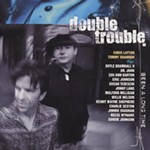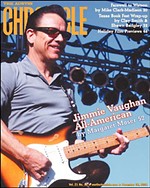Supersizing the Scene
From Rest Stop to Tour Stop
By Andy Langer, Fri., May 12, 1995
"The more facilities that any community can offer, the better its chances of landing national tours," says Pollstar's Gary Bongiovanni, editor of the touring industry's leading trade publication. "For a city like Austin not to have several appropriate venues for larger acts hurt its chances of landing a tour that already has 20 or 30 must-play cities. That definitely seems to be changing."
The change Bongiovanni refers to comes in the form of two relatively new, mid-size (up to 3,000 capacity) venues, the Backyard and Austin Music Hall, as well as the substantially larger and outdoor South Park Meadows (up to 80,000). Despite only holding five shows in its opening season, South Park Meadow's Smashing Pumpkins, Metallica, and Aerosmith concerts all wound up on each band's respective top-three attendance lists for 1994. Last year, the Backyard hosted an estimated total of 68,000 fans for its summer concert series, while Backyard owner Tim O'Connor also spent close to $500,000 to renovate the new Austin Music Hall in time for a crowded spring and summer schedule. The concert industry is big business, and big business' primary focus is attendance, grosses, and booming investment. Booking agents say that these three new venues, in addition to the Erwin Center, City Coliseum, Terrace, Paramount, Bass Concert Hall, and Liberty Lunch, now provide the type of date availability and venue flexibility that has ultimately begun impressing agents to route Austin onto national tour schedules. The prospect of a baseball stadium on the horizon offers even more possibilities. "We now have the luxury in Austin to pick the right buildings on the right dates," says booking agent Jeff Osbourne, who books tours for everyone from U2 to Kevin Salem for Premier Talent.
Yet Osbourne and other booking agents admit that tour scheduling, which Erwin Center director John Graham calls "Three-Dimensional chess," ultimately winds up being far more complicated than just booking the right building on the right date. Well before a show is announced to the public, there's a complex routine behind the scenes to address the needs and desires of both the artist and the venue. Booking agents fulfill the middleman role between an artist's management and a potential venue. With a knowledge about a region's venues, booking agents search out deals that address pre-determined management issues: from ticket prices to how the band would like to be displayed (selling out small venues or playing less crowded large venues for prestige). After putting out word of a tour, booking agents accept bids from parties that see themselves as able to provide the proper venue. These parties are typically promoters or talent-buying groups such as Houston-based PACE and San Antonio-based Stone City, or from the venue's own in-house buyers, like Liberty Lunch's Mark Pratz, who is both the talent buyer and owner of the Austin concert mainstay. At this point, a winning bidder either places the show in his venue or, in the case of talent buyers, rents what they know to be an appropriate and available hall.
It's the second part of the touring equation - who buys the show and where it's placed - that ultimately becomes the most confusing when discussing the local market. Obviously, the success of Austin's three new venues does indeed open more available dates, but what seems to have become the most complicated question regarding both the old and new venues is to whom they are actually open.
PACE Concerts and their involvement with South Park Meadows, the Backyard, and the Austin Music Hall is singularly the source of the new touring landscape's greatest hopes and debate. PACE has been actively booking Southwest venues for over 20 years, although their detractors say PACE has achieved in Houston a "monopoly" on major touring talent. And although PACE has a long history of promoting Austin shows when they'd purchase a tour's regional block, their interest in regularly promoting Austin venues has increased noticeably over the last two years. "It's useful that PACE is involved," says Graham, "because it demonstrates to the industry that there's financial commitment."
The concept that PACE is committed to Austin is a no-brainer. PACE promoted all five South Park Meadows shows last season, and so far has been the only promoter to schedule dates for this current season - beginning July 2 with the on- and off-again Pearl Jam show (and possibly including summer stopovers from R.E.M., Vince Gill, Bon Jovi, Van Halen, and Lollapalooza). South Park owner Abel Theriot maintains that the venue is open to all rental offers, similar to the Erwin Center, City Coliseum, and the Terrace, but adds that PACE has been the most ambitious, and therefore the only, promoter of his venues' shows. And although Theriot says he would like to see a production company add a seated area and book a fuller season of shows of varying sizes, PACE has no apparent plans to either finance seating or book smaller shows. Ultimately, South Park's biggest setback is that nobody in the industry, including South Park and PACE, seem to know entirely if PACE holds "exclusive rights" to the venue. One talent buyer maintains that the confusion over who's doing what at South Park has already cost the venue one major late-summer show.
It's no surprise that "exclusive rights" agreements are often controversial, as it gives only one promoter the right to offer the venue to booking agents. Clearly, in spending the time to consistently book, promote, and produce shows, there's a financial commitment from an exclusive promoter to that venue that is financially beneficial to both parties. "When we make a large investment, we obviously look to recoup and turn profit, " says PACE Vice President Bob Roux. "That means more shows and more opportunity."
Certainly, the busy calendars of the Austin Music Hall and Backyard indicate a land of increased opportunity. Both PACE and O'Connor confirm that PACE has a virtual lock on both Austin Music Hall and Backyard bookings, although O'Connor retains an exclusionary list of artists with whom he has established previous relationships, like Jimmie Vaughan and Willie Nelson. PACE's competitors admit their confusion as to how exclusive PACE rights are at the two venues, maintaining that they hear different things each time they call O'Connor. For their part, PACE warns that competitors placing Backyard and Austin Music Hall offers to acts not on the exclusionary list could find themselves "in a problem with the act."
For the involved parties, including the consumer, exclusives have their advantages and disadvantages. For the promoter and the venues, exclusives generally lead to better financial and political arrangements between a venue's exclusive buyer and a band's booking agent. Agents say it is not unusual for exclusive venues to accept less exciting mid-size or large shows in order to get access to the blockbusters. And although a promoter's ability to buy shows cheaper could hypothetically lower ticket prices, one local, non-exclusive venue owner offers the existence of "anti-trust" legislation as federal precedent that monopolies typically don't work in the consumer's interest. O'Connor contends that consumers do ultimately see savings through an "exclusive," in that competition for a booking creates a bidding war that only escalates price to a point where the difference is tacked onto ticket sales. Others say bidding wars don't actually raise ticket prices, they only give an agent options to find a deal that may be in the band's and the fan's best interest.
"The industry is at a point now where the bands, venues, and promoters know what they need to make, so interested parties either come to the table or don't," says Stone City's Jack Orbin. "A real bidding war is rarer than a band that has loyalties to a certain promoter or venue, and won't play a market because the correct venue is tied up with an exclusive. And certainly, that kind of situation also happens more often than an exclusive [brings] in an act that otherwise wouldn't have come." In any event, booking agents contend that they, not the venues, control ticket prices by watching the national markets and setting their asking prices accordingly. It's PACE and O'Conner's contention that the consumer's benefit comes in service they can trust.
"Our investment in a market means we spend considerable time each day on providing the best concert experience for the fans," Roux says. "We learn from our considerable experience and can make improvements. The bands know we'll be there to pay them in the end, the venues know we're creating a safe environment because we'll be back immediately, and the patron knows we're going to provide accommodating and consistent patron services."
Ironically, the "exclusive" question, and, to some degree, the consistency answer typically go unnoticed by the average fan. "What does it matter to them?" asks Osbourne. "Is anybody going to be giving a deal and lowering tour ticket prices because they got a particular gig?" In actuality, given fairly priced tickets, agents say promoters, and even venues, aren't conscious factors for a majority of fans. Venue owners say that patrons most often comment that they simply want more roadshows to choose from. But from a venue's viewpoint, more shows at more venues could potentially mean less people at each venue. And worst of all, for traditionally busy venues like Liberty Lunch, when fans do consider venues as a factor, they may be more likely to sample newer venues and find something they like.
Luckily, both Liberty Lunch's Mark Pratz and the agents and managers monitoring the Austin roadshow scene say the varying sizes of the new and old venues create a niche market that doesn't seem to be noticeably draining any venue's calendar or fan support. And while Pratz may lose several larger returning acts this summer to the Music Hall, O'Connor says a slow summer stadium circuit could lead him to lose several Music Hall acts to stadium packages. In fact, Pratz says several of the acts he has recently lost or expects to lose had become too big for the Lunch anyway. "I may be bitching up a storm later in the year," says Pratz, "but at this point, I'd like to be optimistic that we'll all be able to complement and supplement each other."
And while Pratz says he has his hands full fighting a new City Hall, owners of several smaller live music venues say their most important battles are to get roadshow-happy patrons to support local talent in between. Pollstar's Bongiovanni points out that concerts don't just compete against concerts, but also with video arcades, restaurants, records stores, and theme parks. Austin's club owners say they agree, and have already witnessed firsthand that when a patron's concert budget is spread between more major roadshows, it's the local bands that get hurt first. "Already I'm seeing local bands discouraged and breaking up left and right, because clubs can't afford to pay them as much because they're not drawing as well," says the Back Room's general manager Mark Olivarez.
One thing on which everybody involved with the venues and touring industry agrees is that their business is cyclical - dependent on tastes and economy. And ironically, there's something stabilizing about the cycles. The knowledge that when Austin's build-it-and-they'll-come wave peaks, the focus will return to local music, can be comforting. And when the cycles flops over again, debate over "exclusives" and new venues may seem just as fresh as it does today. "The market will dictate what works and doesn't every time," says the Erwin Center's Graham. "Touring is part of the entertainment business and it's no different than vaudeville or motion pictures. Change is the only constant."








